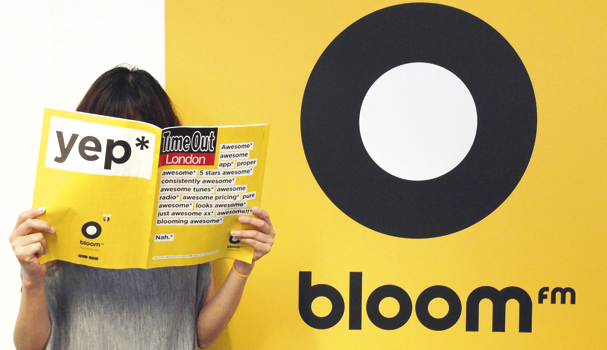The music industry has been turned on its head over the course of the last decade. Some would say the ‘download culture’ that has engulfed the industry is merely a sign of the times. However, whilst the internet has helped uncover a fair proportion of the talent that is currently gracing our airwaves, many new artists are left frustrated in their bids for stardom and riches. The age of paying for music is in danger of reaching a swift conclusion, or so it may seem.
Predictably, this is a fate that Bloom.fm’s Oleg Fomenko is keen to prevent. But the co-founder of the revolutionary mobile music app wasn’t able to put his dream into reality as soon as he probably would have liked. In fact, the very notion of owning his own business was alien to him in his formative years. “I wish I could say I wanted to be an entrepreneur from a very young age but to be honest I didn’t know the word, neither did I know the concept,” he recalls. “Having been born into the Soviet Union, there was no real business or entrepreneurship. The state was running pretty much everything.”
Fomenko did however still possess a couple of qualities that would stand him in good stead for his future endeavours. “From an early age, I had stamina and massive risk appetite,” he explains. “This risk appetite has stayed with me and at that time I think it was hard to understand what it actually was but as the Soviet Union started to crumble, and businesses started to emerge, I realised that it is actually a competitive advantage.”
And Fomenko was soon putting both these traits to good use, selling souvenirs to tourists whilst at university, and evading the authorities in the process. “If you were caught making a transaction in a foreign currency, you could end up in jail,” Fomenko reveals. “In practice, it very seldomly happened because basically, being corrupt, they simply took the money off you, threatened you, put your name on some roster and then let you go. But if you ran very well, that didn’t happen.”
Music did serve as a welcome accompaniment to Fomenko’s exploits in this period, but his passion was somewhat tainted as the digital revolution swept eastward. “I used to value my music collection not by the number of units, but by the amount of money that had gone into it,” he says. “All of a sudden, digital happened and there was an opportunity to have access to all of this music that before either didn’t penetrate through the Iron Curtain, or I didn’t have enough money to buy. But it became blatantly clear very quickly that people started valuing their music collections in gigabytes and later terabytes, which was almost a derogatory way of looking at all of this amazing music that is out there.”
Suffice to say, the seed was planted for the idea that has now come into Bloom. Fomenko’s desire to preserve the earning potential of recorded music grew and grew. An encounter with one musician at a party in Vienna – where Fomenko had moved in 1996 to work for Coca-Cola – was something of a clincher. “It was extremely depressing to hear him saying ‘I used to be able to make a living out of music, right now I need to make a living to make music’,” he comments. “This really cut into me because if we want to have more good music coming our way, we need to make sure that people are motivated, driven and supported to continue improving their skill.”

Fast-forward to 2013 and Bloom.fm has amassed a quarter of a million customers in less than a year, with every major record label – bar Warner – and numerous independent labels coming on board with the beautifully designed mobile music app. It currently offers users no less than 22.3 million tracks to whet their appetite, or more accurately tickle their eardrums. And what is its closest competition? Well, one could say that Bloom loosely operates in an arena that also hosts the likes of Spotify and Last.fm. It enables users to tap into its rich library of tunes from their iPhone or Android at any time of day, and suggests artists based on genres and sub-genres. Yet, there are a few things about Bloom that make it a slightly more intriguing proposition to consumers.
Firstly, unlike the names mentioned above, Bloom was primarily developed with mobile – and more specifically touchscreen devices – in mind. “One of the things we wanted to focus on was how we could make a music app that was designed for a touch screen rather than a mouse and pointer,” explains Fomenko’s fellow founder and Bloom’s chief technology officer Thong (Tum) Nguyen.
Indeed, the name of the app actually sprang from the initial experimentations with mobile, at least to a certain degree. Chance also had its part to play, with Nguyen admitting that Bloom emerged after he misinterpreted a suggestion from design manager Emma Bathgate. He adds: “Visually we had already started to experiment with a user interface featuring large circles. In one brainstorming session, Emma jokingly suggested we call the company ‘Balloon’ which I misheard as ‘Bloom’. To us, the Bloom name perfectly reflected the clean fresh start we intended the mobile project to be.”
Fresh is certainly one way to regard Bloom, and not only because Fomenko and Nguyen’s first project – social music sharing and download website mflow – promised much, but ultimately failed to deliver their dream. The design of their new mobile project is like nothing else on the market. It is simple, slick and easy on the eye; sentiments that are firmly echoed by the customer reviews at the heart of Bloom’s first advertising campaign, launched in September. And simplicity certainly holds true for the Bloom logo, which Nguyen says, “came as a result of our design philosophy – keeping it simple.” He further explains: “The logo itself is reminiscent of vinyl, CDs and the iPod click wheel.”

Yet, whilst the design and platform of Bloom are undeniably appealing, this in itself was never going to incentivise the masses to drag themselves away from the seemingly endless supply of free music on the web. There had to be at least one other hook. Needless to say, a personalised radio service and streaming facility is only one string to the Bloom.fm bow. A unique music ‘borrowing’ system allows users to download tracks to their phone and listen to them offline before swapping them whenever they fancy a change. And the number of Bloom tracks that one has on their phone at any given time is tied to the on-going fee charged to users, with 20 tracks coming in at just £1 per month.
Fomenko believes this price plan gives Bloom the edge over its rivals and opens the door to people who may have previously been unwilling to empty their pockets for new music. “Right now, if you want to listen to music on your mobile, you have a binary choice of either paying zero and not getting anything or having to pay £10 per month,” he says. “What we are doing is simply giving people a ladder that gives them comfort that they can choose whatever level they want.”
Turning the musical tide isn’t going to occur overnight for Fomenko and Ngoyen. However, winning over the big guns and amassing the volume of customers it has since January is a significant first step. One simply can’t help but admire the personal mission that underpins the Bloom.fm story.
“I am not building a business to sell,” insists Fomenko. “I am building a business to actually generate money for artists which was an original compelling case and emotional motivation for me back in the year 2000. Negotiating deals in ten years’ time for a country that probably doesn’t have even a handful of smartphones now would be absolutely fantastic.”
Whilst sticking a tagline of ‘the music app’ on a new venture would usually be enough to raise an eyebrow or two, Bloom.fm is definitely proving itself to be worthy of such a title thus far. ![]()
Share via:


















































